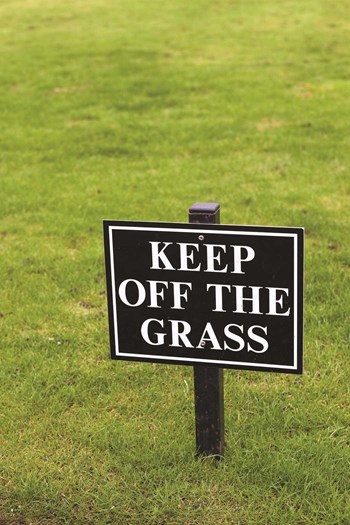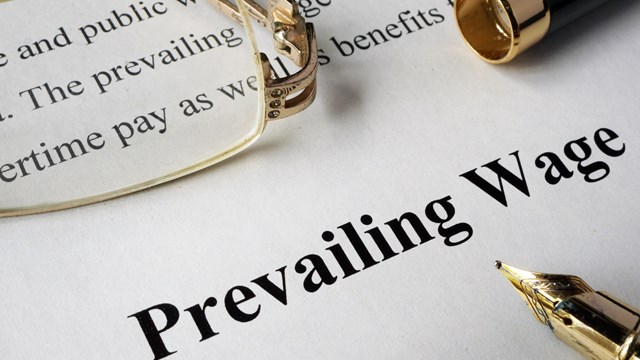
Community living' in the context of a co-op or condo building means abiding by a set of rules and regulations designed to serve the community’s best interests and maintain property values. The building board makes the rules, and the residents abide by them. Usually, this give-and-take is pretty painless but sometimes the rulemakers themselves run amok.
Such was the case when the board of directors in one New York City condo decided that every door in its hallways should look identical, so they adopted a rule prohibiting anything on the doors, reports Eric M. Goidel, a partner with the Manhattan-based law firm of Borah Goldstein Altschuler Nahins & Goidel, P.C.
“Someone put up a decoration during Ramadan [the Muslim holy month],” he recounts, “and residents on the floor complained about it. They wanted our firm to enforce the rule of nothing on the doors. I asked, ‘When is everybody going to take down their mezuzahs?’ They said, ‘Well, the rule says you can’t put anything on the door. The mezuzah is on the door jamb.’ I told them, ‘When we go before the Human Rights Commission, you make that argument, because I cannot.’ State law requires equal treatment under the law. The board could enforce nothing on the doors if it was prepared to also take down mezuzahs or Christmas wreaths, but you can’t pick and choose.”
Where Rules Come From
In a residential community setting—a condominium, cooperative, or homeowners association—the developer writes the initial set of rules and regulations as part of the documentation creating the community. After the transition to owner control, the board of directors or board of managers may rewrite or revise what it inherited, and adopt additional rules and regulations.
In a condo or HOA, the declaration and bylaws provide the basic framework of association governance and management, including election rules and procedures, duties of officers and directors, voting rights, and form requirements. “Some condo bylaws include the house rules. Some refer to house rules and they are attachments. The contents are typically the same. They govern day-to-day conduct within a building,” says Jeffrey M. Schwartz, a partner with Wolf Haldenstein Adler Freeman & Herz LLP, a Manhattan law firm.
Ideally, Schwartz says, the house rules should stem from some underlying authority in the bylaws, but they should not be in the bylaws because the bylaws are hard to amend.
A co-op has a certificate of incorporation, bylaws, and also a proprietary lease that all the shareholders must sign. “The house rules in a co-op are attached to and made a part of the proprietary lease,” says Steve Troup, a partner with the law firm of Tarter Krinsky & Drogin LLP in Manhattan. “The house rules deal with governance and occupancy issues; the bylaws deal with the rights of the shareholder and the corporation, similar to any business corporation in New York State. The house rules provide for housekeeping issues.”
Common and Uncommon Rules
In all types of communities, the rules typically cover garbage disposal and recycling procedures, parking restrictions, use of the recreational facilities, guest privileges, and the community’s pets policy (if pets are allowed). Schwartz cites other examples: “Public hallways can’t be obstructed, the lobby can’t be used as a waiting area for an extended time, no bike riding or skating is allowed in hallways, and deliveries have to go through the service entrance.”
Other kinds of rules also may exist. Some communities limit the times that commercial vehicles are permitted on the premises, a provision originally written to prevent people from moving in or out on Sundays.
Prohibiting smoking in a building’s common areas is not unusual. Goidel says the offering plans of some newer buildings prohibit smoking entirely, and other buildings have adopted no-smoking policies. “You’re now cutting yourself off from 20 percent of the population who might purchase apartments in that building,” he observes. “That might affect sales. It might also attract some of the 80 percent who don’t smoke. It’s a balancing act.”
Some co-op boards have written into the house rules a sublet surcharge, an extra monthly fee imposed on people who rent a unit from a shareholder. “That’s not enforceable,” Troup says. “If it’s ever challenged, a court would throw it out. It would have to be in the bylaws or, more likely, the proprietary lease. Likewise, a flip tax (a fee charged by the corporation when a shareholder sells an apartment) cannot be in the house rules. It must be voted on by shareholders.”
When house rules become outdated, the board can change them—unless the governing documents specifically require a vote of the residents to make a change.
“Co-ops operate under the business corporation law of New York State,” Troup says. “Governance issues are by statute delegated to the board of managers. Shareholders don’t have the power to formulate house rules. The board can pass house rules on its own, but a change in the proprietary lease typically needs a two-thirds vote of shareholders.”
Good and Bad Rules
A good rule “is one that benefits the residents as a whole,” Schwartz says. “A bad rule tries to single out one or two or three people.”
“A good rule has broad interest and concern, and isn’t just a pet project of a particular board member or shareholder/unit owner,” concurs Goidel. “It is also something that will be enforceable.”
By contrast, a bad rule is overly restricting, overly broad, or ambiguous, so that enforcement becomes arbitrary. Goidel says many boards require renter’s insurance even though it wasn’t written into older plans. “If the proprietary lease is silent as to the obligation of residents to get renter’s insurance, a board can’t ‘back-door’ that requirement by adopting a house rule. Most owners see the merits of having this type of insurance, so it doesn’t often become an issue, but where someone challenges it they are likely to prevail.”
The Rules for Broken Rules
When an owner or shareholder violates one of a residential community’s rules, some boards want to institute fines, but “the courts will not uphold a fine unless it is specifically authorized in the proprietary lease or bylaws,” Troup says.
A board can suspend an errant owner or shareholder’s right to certain privileges until the violation is corrected, but it cannot deny the violator access to or the use of his home. Thus, Schwartz says, “you can’t bar people from the elevator, you can’t cut off their utilities, and you can’t bar them from having guests. You can’t specify the number of guests at any one time. You can have noise rules, but not rules limiting the number of people a resident can host.”
If none of this resolves the issue, the board can file suit. In New York, condo lawsuits go to Supreme Court [the trial-level civil court]. “You have to sue for an injunction, and the judge will determine whether a substantial breach of bylaws occurred,” Troup says. “The owner can’t be required to sell the apartment but can be enjoined from the offending conduct. If it doesn’t stop, the board then can get an order holding the offender in contempt of court.” This may take several years.
In a co-op, the board can serve a shareholder who is violating a substantial obligation of his tenancy with a “notice to cure” by a specific date. “At the end of that period, if the breach is not cured, the board can terminate the proprietary lease, go to Housing Court, and get a warrant to evict the shareholder-tenant. Then the apartment is sold,” Troup says. The sale proceeds first reimburse the corporation for its expenses and then pay off any mortgage debt. What’s left goes to the former shareholder. A Housing Court case may be resolved within several months.
What Should Happen First
In many cases, an enforcement process leading to fines, suspension and court action could have been resolved amicably at an earlier stage in the dispute. Goidel recommends that the board or management first send a letter to inform the resident of the violation. “Sometimes someone is violating a house rule and doesn’t know it,” he says. If the problem persists, the attorney should send a more insistent letter. If that doesn’t work, the next step is litigation.
“Sometimes you would skip a step or two in this process if the situation is really interfering with the neighbors,” Goidel says. He recalls one rapid ratcheting-up in a building that prohibited Jacuzzis. “A resident installed one anyway. He was using it every night. It was overflowing and raining on the person below.”
When Renters Break Rules
Unless the rules specifically state otherwise, renters enjoy the same rights and privileges as owners, including use of the recreational facilities. Some communities have different rules for owners and renters, on the assumption that owners have more of a vested interest in the community and would be more careful. Often this distinction applies to pets, which owners may have and tenants may not.
In a co-op a renter is a subtenant, subject to the proprietary lease and house rules. In a condo or HOA, the renter is a tenant subject to the bylaws and house rules. In either setting, if a renter breaks the rules, the board can take action against the owner.
“Virtually all co-op subleases I’ve seen read the proprietary lease and house rules into the sublease. There’s almost always a provision that says the proprietary lease and house rules are part of the sublease and the subtenant agrees to abide by them,” Goidel says.
“In a co-op, boards have the right to approve subtenants, and they can condition their approval on certain language being included in the sublease. In a condo, because it’s real property, the board doesn’t have the same power over the leasing of apartments. At best, it may have a right of first refusal to match the offer being presented.”
If a renter breaks a rule, “you have to enforce your right against both the owner and the renter,” Goidel says. “You have a direct relationship with the owner but not with the renter.” In a condo, Troup says, “the landlord relationship is between the unit owner and his tenant, but not between the condo board and its unit owners. The unit owner can take the problem tenant to Housing Court and have him or her evicted. If the unit owner doesn’t do that, the board can go to Supreme Court for an injunction against both the unit owner and the tenant.”
George Leposky is a freelance writer is a frequent contributor to The Cooperator.






Leave a Comment